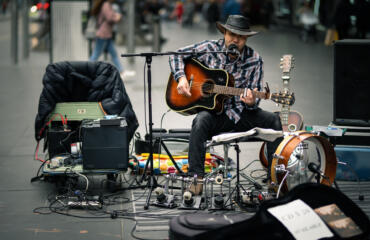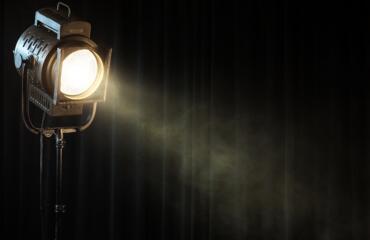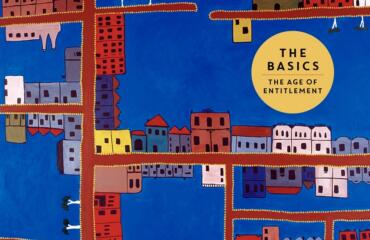Behind the espresso machine at The Merri Table cafe in East Brunswick, you’ll find a bucket brimming with scraps of plastic. The cafe’s bearded barista, Cesar Marulanda, checks it every shift, topping it up with used milk bottle lids and plastic wrap.
Come the weekend he carts the bucket to his Essendon studio and loads the plastic waste into the oven, turning the dial up to around 170 °C. Once the items are melted down, Marulanda pulls on protective gloves and a mask to shield himself from the fumes and reshapes the malleable, molten slag into bags, wallets, raincoats — products he sells at markets and through his website.

Marulanda’s moulds refashioned from plastics. Photo: Cesar Marulanda
His venture is one of a handful of local start-ups refashioning rubbish from Melbourne’s famously bloated cafe scene.
These businesses are combatting slow recycling efforts, generating profit and changing opinions on what is waste and what is a resource.
Growing up in an environmentally conscious family in rural Colombia, Marulanda had long been aware of the impact of poor waste management. But it wasn’t until he moved to Australia 14 years ago, and began working in Melbourne’s hospitality industry, that he grasped just how wasteful cafés and restaurants can be.
A 2015 study conducted by RMIT University found that nearly a quarter of the food from Australia’s hospitality industry ends up in the bin.
“We need to get rid of the idea that we can just buy and throw it out,” Marulanda says. “We cannot think like that anymore. No more.”
As for the sustainability of his business model, Marulanda points out that the raw materials come free. He sells his products for anywhere between $30 to $120.
“It’s incredibly profitable if you do have the time and the skills and the ideas.”
His boss Sally Kennedy, manager of The Merri Table, which is nestled inside the CERES Community Environment Park, is equally enthusiastic about the venture.
With the Chinese ban on importing recyclable rubbish taking effect at that start of the year, Victorian councils have been forced to restrict the products they will pick up on bin night. Many products that were once recyclable now end up as landfill, causing an ethical dilemma for sustainably minded residents and businessfolk such as Kennedy.
She says food safety regulations often require produce to be packaged in soft plastics, generating a huge amount of waste for the cafe.
“They’ve just changed the rules for Moreland City, so you can’t put soft plastics in the recycling bin anymore … so now it’s up to us to work out what we do with it.”
Kennedy believes that without businesses such as Marulanda’s, cafes wanting to reduce their contribution to landfill would have to carry out a “drastic overhaul” of what they offer customers.
Another business with a creative eye on waste is Reground, founded in 2014 to reduce the amount of organic waste from Melbourne’s cafes ending up in landfill. Coffee grounds contribute to greenhouse gas emissions when left to decompose in a rubbish dump, but the nutrient-rich product – produced by the bucketful across Melbourne’s latte-land – can also be put to good use as a garden fertiliser.
Driving their newly-purchased van around inner-city Melbourne, the Reground team collect leftover coffee grounds from cafes and distribute them to community and home gardeners. In the past four years they have grown to service 65 different cafés.
Director of Reground Kaitlin Reid says Melbourne is the perfect place to trial a sustainably-focused business.
“We have so many forward-thinking cafes and roasteries here, so many people who are setting the standard in coffee quality and in other practices in the industry.”
However, not everyone believes these businesses are as sustainable as their environmental goals. Mark Douglass, a successful glassblower, has struggled to get his glass recycling project off the ground.

Marulanda takes cover in his recycled raincoat. Photo: Hernan Lopera
His plan, Upcycled Glass, would have seen the collection of used glass bottles and other products from Melbourne’s cafes and restaurants recycled into new products for the hospitality industry.
But the financial burden has proven too great for his small business. He says wages, as well as the cost of rent and utilities, mean Upcycled Glass can no longer afford to operate and investor interest in Upcycled Glass fell away when it came to financial support, Douglass says.
“Everyone loves the idea,” he explains. “They love the idea of recycling, but at the end of the day they don’t want to pay more than a glass from Kmart.”
Douglass says local councils and governments need to better support sustainable business ideas.
“In order to do it commercially it has to be subsidised by the government … the idea is there, it does work to a certain level, but doing it as an independent, private person has its setbacks.”
Sustainability Victoria spokeswoman Hannah Grant says her organisation is “calling out to businesses to make them more sustainable” through a range of grants and state government sponsored projects. One of these is the Social Impact Investment for Sustainability, which provides grants and low-interest loans to “investment-ready” social enterprises. But this loan is only available to established businesses that have already been up and running for one year.
For now, Douglass is thinking of running workshops where individuals can upcycle their own used glass bottles.
“It’s not going to change the world,” he says, “but it’s about awareness.”




